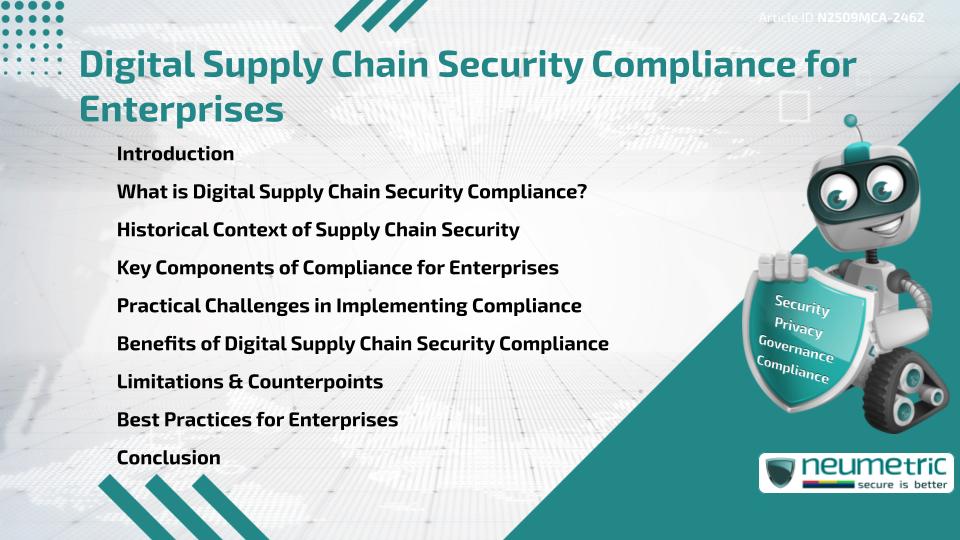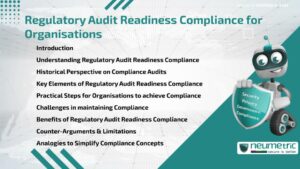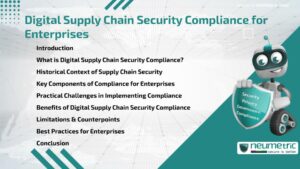Table of Contents
ToggleIntroduction
Digital supply chain security compliance has become a critical priority for enterprises in all industries. As businesses increasingly rely on digital platforms, cloud technologies & global vendors, the Risk of cyberattacks targeting supply chains has grown significantly. Ensuring compliance helps enterprises manage Risks, protect Sensitive Data & maintain trust with partners & Customers. This article explores the concept of digital supply chain security compliance, its history, key components, challenges, benefits, limitations & Best Practices.
What is Digital Supply Chain Security Compliance?
Digital supply chain security compliance refers to the set of Policies, frameworks & standards that enterprises must adopt to secure their supply chain from Cyber Threats. It involves ensuring that all vendors, contractors & partners adhere to established Security Measures. Compliance reduces Vulnerabilities in interconnected systems & supports resilience against attacks.
Historical Context of Supply Chain Security
Supply chain security has traditionally focused on physical goods, customs procedures & transportation safeguards. However, with digital transformation, enterprises now face Risks that extend beyond warehouses & shipping routes. Notable cyberattacks such as those against global software providers have revealed how deeply digital Vulnerabilities can disrupt entire industries. Over time, governments & regulatory bodies have introduced specific frameworks & guidelines to enforce compliance.
Key Components of Compliance for Enterprises
To achieve digital supply chain security compliance, enterprises must address several key components:
- Vendor Risk Management: Assessing Third Party vendors & their security practices.
- Data Protection Measures: Safeguarding Sensitive Data exchanged across the supply chain.
- Regulatory Adherence: Aligning with standards such as ISO 27001 & SOC 2.
- Continuous Monitoring: Implementing real-time monitoring of digital assets & partners.
- Incident Response Planning: Preparing structured responses to cyberattacks.
Practical Challenges in Implementing Compliance
Enterprises face several challenges in adopting digital supply chain security compliance. One major challenge is the diversity of vendors with varying security standards. Another difficulty is the cost of implementing compliance frameworks across large, global operations. Additionally, Employees & vendors may lack the necessary training to maintain compliance effectively.
Benefits of Digital Supply Chain Security Compliance
Despite challenges, digital supply chain security compliance offers numerous benefits:
- Risk Mitigation: Minimizes exposure to cyberattacks & data breaches.
- Business Continuity: Enhances operational resilience during disruptions.
- Reputation Protection: Builds trust with partners & Customers.
- Regulatory Confidence: Ensures that enterprises meet legal & industry requirements.
- Operational Efficiency: Streamlines vendor management & internal processes.
Limitations & Counterpoints
While compliance strengthens enterprise security, it is not a guarantee against Cyber Threats. Attackers may still exploit unforeseen weaknesses. Some critics argue that compliance frameworks are rigid & may slow down Business Operations. Others point out that compliance often becomes a checkbox exercise rather than a meaningful security improvement.
Best Practices for Enterprises
To maximize the benefits of digital supply chain security compliance, enterprises can adopt several Best Practices:
- Establish a centralized compliance management system.
- Conduct regular vendor audits & assessments.
- Provide ongoing Cybersecurity training to Employees & partners.
- Integrate Compliance Requirements into vendor contracts.
- Use automation tools for monitoring & reporting compliance.
Conclusion
Digital supply chain security compliance is no longer optional for enterprises but a necessity to safeguard operations in a hyperconnected world. By understanding its components, challenges & benefits, enterprises can implement robust strategies that balance Compliance Requirements with operational efficiency.
Takeaways
- Digital supply chain security compliance protects enterprises from growing Cyber Threats.
- Compliance frameworks help manage Risks & maintain trust.
- Enterprises must balance cost, training & operational efficiency when implementing compliance.
- Best Practices include vendor audits, training & automation tools.
FAQ
What is the primary purpose of digital supply chain security compliance?
Its main purpose is to protect enterprises from cyber Risks by ensuring all vendors & partners adhere to security standards.
How does digital supply chain security compliance differ from traditional supply chain security?
Traditional supply chain security focuses on physical Risks, while digital compliance addresses Cyber Threats across interconnected networks.
What regulations influence digital supply chain security compliance?
Regulations include ISO 27001, SOC 2, GDPR & NIST guidelines, depending on the industry & region.
Why is Vendor Risk Management important for compliance?
Vendors often have access to sensitive enterprise data, making their security practices critical for overall supply chain protection.
What are the common challenges enterprises face in compliance?
Challenges include high costs, varying vendor standards & lack of training for staff & partners.
Can compliance guarantee complete protection from cyberattacks?
No, compliance reduces Risks but does not provide absolute protection against all Threats.
How can automation support compliance efforts?
Automation tools streamline monitoring, reporting & vendor assessments, reducing manual workload & errors.
Need help for Security, Privacy, Governance & VAPT?
Neumetric provides organisations the necessary help to achieve their Cybersecurity, Compliance, Governance, Privacy, Certifications & Pentesting needs.
Organisations & Businesses, specifically those which provide SaaS & AI Solutions in the Fintech, BFSI & other regulated sectors, usually need a Cybersecurity Partner for meeting & maintaining the ongoing Security & Privacy needs & requirements of their Enterprise Clients & Privacy conscious Customers.
SOC 2, ISO 27001, ISO 42001, NIST, HIPAA, HECVAT, EU GDPR are some of the Frameworks that are served by Fusion – a SaaS, multimodular, multitenant, centralised, automated, Cybersecurity & Compliance Management system.
Neumetric also provides Expert Services for technical security which covers VAPT for Web Applications, APIs, iOS & Android Mobile Apps, Security Testing for AWS & other Cloud Environments & Cloud Infrastructure & other similar scopes.
Reach out to us by Email or filling out the Contact Form…





